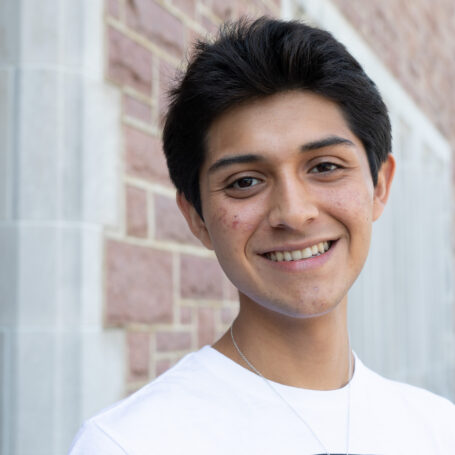
Emilio Parra-Garcia grew up in a home where academic conversations were commonplace chats over the dinner table. From discussions about public health policy to nonprofit work, Parra-Garcia has always known that a university degree was in his future.
“The expectation has always been that I attend a university,” said Parra-Garcia. “That is a huge reason my parents relocated to the U.S. – so that I could get a better high school education and be in a better position to attend a university here.”
At nine, Parra-Garcia moved with his parents from Mexico City to Omaha, Neb., and while that transition had many challenges and opportunities, he said one of the biggest challenges he faced as a child was relating to people who didn’t look like him.
“It was hard coming from one place where everybody sort of looks like one another – in a Latinx sense – as opposed to a city where there were few people who looked like me,” he said. “Something else I grappled with, and maybe something that wasn’t as welcomed was my sexuality.”
Parra-Garcia said that although he is very fortunate that his parents paved a path for him to pursue a degree at an elite institution like them, his transition to WashU, and unpacking his identity, was not exactly easy.
“I am fortunate to have a very close bond with both of my parents,” he said. “I’ve had my own experiences aside from them, but it was a tough transition moving away from them. There are a lot of conflicting narratives around my identity and that intersectionality has been a struggle.”
Parra-Garcia said that there is a stigma in many Latin American households about queer lifestyles, and that he has felt some pressure to hide his identity.
“Here, though, my intersectionality has been very eye opening,” he said. “I’ve come to realize I’m a unique individual, and more recently, I’ve been proud of that. So, I decided, I’m not coming out anymore. It’s who I am. Why should I have to hide it?”
Parra-Garcia said that last year, his first year on campus, he was in a very scary place, and struggling to see his future clearly. So, he reached out for help at Habif Health and Wellness Center.
“I got to a very bad physical and mental spot, but I’ve been able to recover and heal with the help of Dr. Jennifer Hillman at Habif,” he said. “She’s been able to help me see the beauty in taking time for myself and mixing social and academic life. I also now have a place to voice my concerns and to have a way to keep my mental and physical health in check. If I didn’t have her support, it would have been difficult to even continue at WashU. I am so grateful to have her.”
While the challenges he faces are not over, Parra-Garcia has found a community of people for himself at WashU and now looks forward to his second year at the university.
“I found a community in the Annika Rodriguez Scholars Program; it is my biggest home here,” he said. “I’m so fortunate to have Rod, as we call it, in my life. I’ve been able to connect with people and listen and hear stories from all different backgrounds. Outside of Rod, it’s been a challenge to find other Latinx and queer individuals, and so it’s been up to me to form those connections, to seek those communities, and to be a safe space for others to come to.”
With that, he’s made it a point to become more involved on campus, more fully immersing himself in student clubs and organizations like the Association of Latin American Students (ALAS) and WashU Embody, a club focused on raising awareness for eating disorders and promoting inclusiveness of all bodies on WashU’s campus. He is also hoping to join a new organization this year, GlobeMed, which partners with and fundraises for an Ugandan global health NGO aimed at strengthening community-based health solutions.
“I think that part of intersectionality is recognizing differences within ourselves and while they may be conflicting, or difficult to understand, those sorts of disconnects are what make you beautiful, he said.”